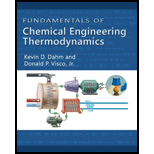
(A)
Interpretation:
Determine the work and heat transfer for the process.
Concept Introduction:
An energy balance equation piston cylinder arrangement.
Here, mass of the system is
Here, the height, velocity, shaft work is zero.
The expression to calculate the amount of work done
Here, initial and final specific volume is
(B)
Interpretation:
Determine the work, heat transfer for the process, and the percentage of part A far away from the Part B.
Concept Introduction:
The ideal gas equation in terms of initial volume:
Here, molecular weight of water is MW, number of moles is N, gas constant is R, and initial temperature is
The ideal gas equation in terms of final volume:
Here, molecular weight of water is MW, number of moles is N, gas constant is R, and initial temperature is
The expression to calculate the work done through expansion or contraction:
The expression to calculate the specific change in internal energy:
Integrate the above equation with initial and final condition.
Here, constant volume heat capacity on a molar basis for ideal gas is
(C)
Interpretation:
When the steams expands and work done is zero in the part A, the percentage of part A far away from the Part B.
Trending nowThis is a popular solution!

Chapter 3 Solutions
Fundamentals of Chemical Engineering Thermodynamics (MindTap Course List)
 Introduction to Chemical Engineering Thermodynami...Chemical EngineeringISBN:9781259696527Author:J.M. Smith Termodinamica en ingenieria quimica, Hendrick C Van Ness, Michael Abbott, Mark SwihartPublisher:McGraw-Hill Education
Introduction to Chemical Engineering Thermodynami...Chemical EngineeringISBN:9781259696527Author:J.M. Smith Termodinamica en ingenieria quimica, Hendrick C Van Ness, Michael Abbott, Mark SwihartPublisher:McGraw-Hill Education Elementary Principles of Chemical Processes, Bind...Chemical EngineeringISBN:9781118431221Author:Richard M. Felder, Ronald W. Rousseau, Lisa G. BullardPublisher:WILEY
Elementary Principles of Chemical Processes, Bind...Chemical EngineeringISBN:9781118431221Author:Richard M. Felder, Ronald W. Rousseau, Lisa G. BullardPublisher:WILEY Elements of Chemical Reaction Engineering (5th Ed...Chemical EngineeringISBN:9780133887518Author:H. Scott FoglerPublisher:Prentice Hall
Elements of Chemical Reaction Engineering (5th Ed...Chemical EngineeringISBN:9780133887518Author:H. Scott FoglerPublisher:Prentice Hall
 Industrial Plastics: Theory and ApplicationsChemical EngineeringISBN:9781285061238Author:Lokensgard, ErikPublisher:Delmar Cengage Learning
Industrial Plastics: Theory and ApplicationsChemical EngineeringISBN:9781285061238Author:Lokensgard, ErikPublisher:Delmar Cengage Learning Unit Operations of Chemical EngineeringChemical EngineeringISBN:9780072848236Author:Warren McCabe, Julian C. Smith, Peter HarriottPublisher:McGraw-Hill Companies, The
Unit Operations of Chemical EngineeringChemical EngineeringISBN:9780072848236Author:Warren McCabe, Julian C. Smith, Peter HarriottPublisher:McGraw-Hill Companies, The





